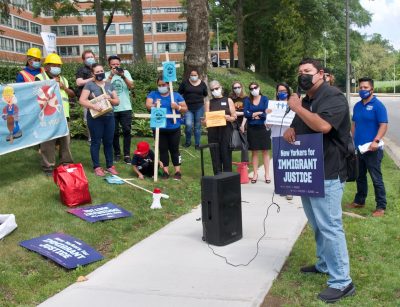Excluded Workers, Advocates Protest Fund Eligibility Requirements
By Samuel Rowland
An alliance supporting workers excluded from federal stimulus money demanded last week that the state rewrite recently released regulations for workers to access money from a $2.1 billion fund approved by the state this spring.
The Fund Excluded Workers (FEW) Coalition rallied outside the New York Department of Labor’s White Plains offices on Bloomingdale Avenue urging Gov. Andrew Cuomo and state Labor Commissioner Roberta Reardon to institute more realistic documentation standards in order to claim funds.
The Excluded Workers Fund provides 50 percent of lost income up to $15,600 before taxes for Tier One recipients and up to $3,200 under the less stringent requirements needed for Tier Two.

One of the organizers of the rally, Peekskill Councilwoman Vanessa Agudelo, who is also manager of member engagement in the Hudson Valley for the New York Immigration Coalition, said the level of documentation that is being requested from day laborers and those who work in the cash economy by the state Department of Labor is unattainable.
The department released its regulations earlier last week in advance of this week’s opening of the application process.
“We need regulations that acknowledge these nuances and work to ensure that all workers…have access to the relief they so desperately need and deserve,” Agudelo said.
Agudelo estimated that there may be about 20,000 excluded workers who were presumed to be eligible for help in the Hudson Valley alone and as many as 290,000 statewide.
Key issues that the FEW Coalition is contesting is a requirement that applicants must prove a 50 percent income loss, a threshold more restrictive than unemployment insurance, onerous employment documentation and an overly narrow set of documents to prove prior employment, identity and residency.
Janet Rondon, representing the Community Resource Center, said many of those who need the money the most are likely to be turned down.
“It is not fair to put higher standards on a fund that has been long waited for,” Rondon said. “It’s not fair that at this point, days from the program to be launched, we are now struggling to produce documents that we’re not able to have access to, not because we don’t want to, it’s because employers don’t produce employment letters, it’s because employers don’t want to acknowledge that they hire immigrant workers.”
State Sen. Shelley Mayer (D-Yonkers), a supporter of the bill that created the fund, attended and spoke at the rally. She said the Department of Labor last week released the list of documents needed to be considered to recover money from the fund, with each document assigned a point value. Eligible excluded workers must accumulate a certain number of points in certain categories to qualify.
For example, a passport is valid document but a letter from a consulate is not.
Mayer said she and other lawmakers are trying to convince Department of Labor officials to rework the regulations, which were intended to exercise prudence to prevent fraud but also provide flexibility.
“They’ve made rules that are too strict and are not justified by what we did,” Mayer said. “We know what we were fighting for – excluded workers. Excluded workers cannot be excluded from the Excluded Workers Fund by rules that are too strict and don’t reflect the reality of your work.”
Roberto Zumba, worker center and outreach coordinator for Neighbors Link, said thousands of workers would be shut out from the funds unless changes are made.
Several workers spoke during the rally about their experiences trying to provide for themselves and their families through the pandemic. Cecilia Sanchez, a single mother of two children from Port Chester, said she will likely be excluded.
“I am here to represent all those women that are here in Westchester that couldn’t clean up the houses that they were cleaning because no one wants us to be in their houses,” Sanchez said. “We lost our jobs. We lost our food to feed our family. And most of us have to live in another place because we couldn’t afford our rents. So please help us.”
The Excluded Workers Fund passed by the legislature was a compromise from an initial proposal that was on par with the maximum $600 a week supplement to unemployment benefits. In early June, representatives from immigrant rights organizations staged a 23-day hunger strike involving about 70 New York residents before the legislation was approved.
Martin Wilbur contributed to this article.

Examiner Media – Keeping you informed with professionally-reported local news, features, and sports coverage.
